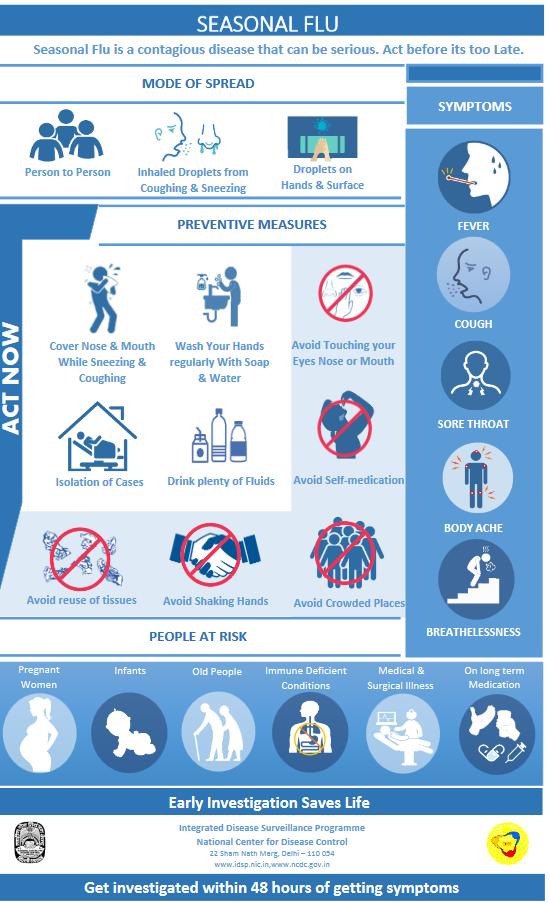Seasonal Flu facts
Seasonal Flu facts
Flu like illness can be caused by many different flu viruses. Influenza A / H1N1 (earlier called 'swine flu") is a type of seasonal flu virus that now occurs around the world.

What to do when you have flu like illness?
- Flu like illness can present as - fever, cough/ Sore throat, headache, body ache and in some cases - diarrhea and vomiting.
- Most patients with seasonal flu will recover after a mild illness (mild fever and Cough/ sore throat).
- Not every patient with flu like illness needs testing or specific treatment such as antiviral drug Oseltamivir. Your doctor can assess and advice.
- If you are sick with mild flu-like illness (low fever, slight cough), it is recommended that you limit contact with others as much as possible to prevent transmitting infection to others.
- Take paracetamol if you have fever, drink plenty of fluids, eat nutritious food and take rest. Stay home for at least 24 hours after fever is completely gone.
- Wash your hands often with soap and water, and cover your nose and mouth when you sneeze.
- Do continue to monitor illness and get yourself checked after 24-48 hours by a doctor. Seek immediate medical attention if you have high fever and severe cough.
- Inform the health care staff when you visit a health facility regarding your symptoms of flu. The staff will guide you to the influenza screening OPD/ward. You should use a mask or keep your mouth covered with a clean handkerchief.
If you have high fever and severe cough
If fever is high (more than 39°C or 102°F) and you are having severe cough, seek immediate medical attention. The doctor will give you specific antiviral medicine (oseltamivir) and other medicines (antibiotics, if needed). No testing is needed.
High risk groups to prevent flu-related complications need immediate care
- Some people are at high risk of developing serious flu-related complications (such as pneumonia) if they get sick. High risk categories also includes pregnant women, young children, people 65 years and older, health care workers, caregivers of a flu patient, in addition to people of any age with certain chronic medical conditions (such as asthma, diabetes, lung diseases, kidney or heart disease), cancer or HIV/AIDS or those on steroid medication.
- If you belong to any of the above high risk groups and come down with flu like illness, it is important to seek early medical care : although you may not be tested, you would require some specific medicines (Oseltamivir) as soon as you develop symptoms (within 24-48 hours). Follow your doctor's advice.
Who Should undertake a Laboratory Test?
Laboratory testing is only required for hospitalized patients.
Red Flag Signs for flu-related complications
lf in addition to usual flu like symptoms, if patient has one or more of the following, immediate hospitalization, testing and treatment is needed.
| Adults | Children |
|---|---|
|
|
Source : Ministry of Heath and Family Welfare - Flu facts
Last Modified : 7/3/2023
© C–DAC.All content appearing on the vikaspedia portal is through collaborative effort of vikaspedia and its partners.We encourage you to use and share the content in a respectful and fair manner. Please leave all source links intact and adhere to applicable copyright and intellectual property guidelines and laws.
RELATED ITEMS
